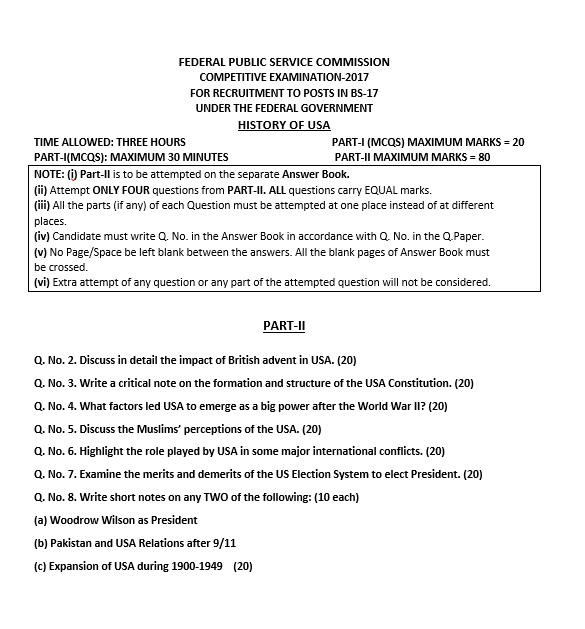History of USA 2017
No. 2. Discuss in detail the impact of British advent in the USA. (20)
No. 3. Write a critical note on the formation and structure of the US Constitution. (20)
No. 4. What factors led the USA to emerge as a big power after World War II? (20)
No. 5. Discuss the Muslims’ perceptions of the USA. (20)
No. 6. Highlight the role played by the USA in some major international conflicts. (20)
No. 7. Examine the merits and demerits of the US Election System to elect a President. (20)
No. 8. Write short notes on any TWO of the following: (10 each)
- Woodrow Wilson as President
- Pakistan and USA Relations after 9/11
- Expansion of USA during 1900-1949
Summaries of Questions:
No. 2. Discuss in detail the impact of British advent in the USA.
The British colonization of America introduced governance systems, the English language, and common law, shaping the country’s cultural and political foundation. However, it also led to exploitation, Native American displacement, and conflicts, ultimately fueling revolutionary sentiment against colonial rule.
No. 3. Write a critical note on the formation and structure of the US Constitution.
The US Constitution, drafted in 1787, established federalism, separation of powers, and checks and balances. While it ensured individual rights and a democratic framework, critics argue it initially excluded women, minorities, and enslaved people, reflecting societal inequalities of the time.
No. 4. What factors led the USA to emerge as a big power after World War II?
Post-WWII, the USA’s economic dominance, industrial growth, and technological advancements solidified its global leadership. Strategic alliances like NATO, the Marshall Plan, and military prowess, combined with the Cold War rivalry with the USSR, cemented its superpower status.
No. 5. Discuss the Muslims’ perceptions of the USA.
Muslim perceptions of the USA vary, ranging from admiration for its freedoms and opportunities to criticism of foreign policies, particularly in the Middle East. Actions like the Iraq War, drone strikes, and support for Israel contribute to distrust and negative views in many Muslim communities.
No. 6. Highlight the role played by the USA in some major international conflicts.
The USA played significant roles in conflicts like World Wars I and II, the Korean War, the Vietnam War, and post-9/11 interventions in Afghanistan and Iraq. It often acted as a global peacekeeper or enforcer, driven by strategic, ideological, or humanitarian motives, though outcomes have been controversial.
No. 7. Examine the merits and demerits of the US Election System to elect a President.
The US Electoral College system ensures representation for smaller states and prevents urban dominance. However, it can undermine popular vote outcomes, lead to unequal campaigning focus, and raise questions about democratic fairness, especially in close elections.
No. 8. Write short notes on any TWO of the following:
Woodrow Wilson as President:
Wilson, serving from 1913–1921, championed progressive reforms, led the USA during WWI, and advocated for the League of Nations. His leadership shaped modern US diplomacy, though his racial policies drew criticism.
Pakistan and USA Relations after 9/11:
Post-9/11, the USA and Pakistan aligned in the War on Terror, with Pakistan receiving aid and strategic significance. However, relations were strained by issues like drone strikes and mistrust.
Expansion of the USA during 1900–1949:
The USA expanded its influence through territorial acquisitions, industrial growth, and global involvement in World Wars, transitioning from isolationism to becoming a dominant global power.
